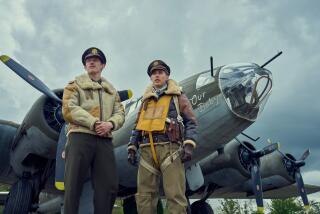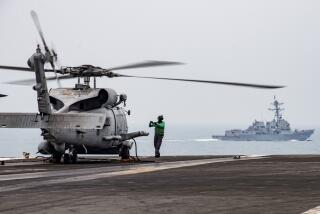The Grunts Behind the Glory
With flashy flight suits and valiant posture, the pilots who delivered the first airstrikes against Iraq are a focus of global attention. But aboard this nuclear-powered aircraft carrier, the air crews are merely the most visible players in a nautical ant colony where every movement contributes to the mission.
Those toiling below the flight deck play their parts out of the spotlight. Their names are not stenciled on fuselages, nor is their pride or peril often on display to the public. They assemble the bombs, rescue the missing, feed the crew and maintain order. They keep the planes flying, the catapults steaming, the trash cans empty and the gas tanks full.
The following three sailors, like the rest of the more than 5,500 inhabitants of this floating community, contribute in their way.
Even in combat, it takes a village.
The Rescuer
James Endicott spends his days preparing for what everyone hopes will never happen.
He packs parachutes for the fliers who might be shot down or have to ditch their aircraft. He is also ready to fight the fires that are among the most daunting disasters to befall ships at sea. And he deploys within five minutes of a man-overboard announcement, ready to render first aid.
Mostly, though, he trains with a dozen crew members in a niche service of the maintenance department: testing valves, rolling out silks, and fitting survival gear into the hard-plastic parachute packs or ejection-seat assemblies.
“I get a lot of pride out of it, even if what we do doesn’t show a lot. It’s pretty challenging work and sets me aside, as there are only two of us out of more than 5,000,” he said of the duties that define his rate and rank: petty officer second class, parachute rigger.
A 26-year-old self-described “surfer bum” from San Diego, Endicott chose the search-and-rescue services in a quest for adventure after a series of mundane jobs. He worked in a bakery, paved roads, and sold floor tile and vacuum cleaners before joining the Navy three years ago.
“It’s not every day, but there are times when it’s pretty exciting,” said the bespectacled sailor. “Man-overboards are pretty intense. They always come when you’re in your rack. I can sleep through almost everything on the 1MC [shipwide intercom], but I always wake up for the ‘Navy Blue’ calls and the bells.”
Those are codes for fire on the flight deck or a crewmate in trouble, hazards to which he has to respond as a member of the disaster team known as the “flying squad.” He’s been summoned for at least 15 man-overboard searches, all of which ended successfully, and he’s packed dozens of parachutes that no one has yet needed to open.
Packing a chute takes half a day, even longer for those encased in ejection seats on the more sophisticated aircraft, such as the F/A-18C Hornets that are the workhorses of aerial war. Those seats are veritable survival kits, with life rafts, emergency oxygen supplies, high-energy biscuits and even fishing line -- supplies intended to keep a downed pilot alive behind enemy lines.
Each parachute has four colored gores, or sections, that a downed flier can put to use: orange to attract the attention of search-and-rescue aircraft, and green, white and beige for camouflage in different terrains or in snow. Some chutes are equipped with an air grenade that can inflate them enough to cushion the impact of landing even when triggered just 50 feet from the ground.
For ditching in the sea, the rip cord can release the chute to prevent the aviator from being dragged under by the waterlogged cloth’s weight.
“I’m lucky because I don’t have to feel like I’m endangering anyone’s life in Iraq, even though I’m part of the whole thing,” said Endicott, who plans to reenlist and hopes to get into an officer-training program. “My role is preservation of life, so I don’t have to feel guilty for dropping bombs on people.”
The Cop
Scott Leverett’s workplace is known as the 72nd Precinct, the Lincoln’s cop shop, which comes complete with a steel-mesh window to separate peace officers from perps. His job as a master-at-arms patrolman is to ensure security on the massive ship.
“This is like a little city. We don’t have gangs, but we’ve got a lot of similar problems, like fighting and theft,” said the 40-year-old petty officer second class with 12 years in the Navy. “Then we have military laws to enforce on top of that. We get a lot of cases that involve disrespect.”
A former chef from Portland, Ore., Leverett said he thrives in a role many here would prefer to avoid. Most of those patrolling the 18-story vessel are on temporary assignment from other departments for six to nine months, giving the military police force the extra muscle needed to maintain shipboard order.
“If my staying out [at sea] another six months means we don’t have two more office towers going down, I’m all for it,” he said, confident of the connection between his behind-the-scenes job and the broader goal of combating terrorism.
Having an influence on crew members in trouble is a more immediate satisfaction.
“There was a guy out here a while ago whose buddies said he was suicidal,” Leverett said. “He didn’t say that outright -- if he did, I’d have had to call the psychologist right away. But he needed to know someone wanted to know what he was thinking and was willing to listen.”
Infractions serious enough to earn brig time have been relatively few, “especially considering how long we’ve been out here,” he said of the crews’ current eight months at sea. A few stolen wallets, occasional contraband seizures, the odd couple seeking forbidden privacy in the ship’s darkened recesses -- those are the usual departures from shipshape order.
An appearance before a captain’s mast, the shipboard court procedure held about once a week and presided over by Capt. Kendall Card, is usually enough to correct a crew member’s behavior, Leverett said.
Theft is the biggest problem on naval vessels, despite the increasingly limited opportunities to smuggle booty to shore. Metal detectors are set up to screen those departing for port calls, which helps nab people who have stolen laptops, cameras or other items. Wardroom 3, where the souvenir silver is kept, is checked by passing patrols, as is the captain’s office, where a priceless letter signed by Abraham Lincoln is stored.
Nerves frayed by the ship’s extended deployment had shown in a rise in insubordination, Leverett said. But once the war got underway Wednesday, the petty grievances and grumblings fell by the wayside. Leverett expected a veritable crime-free community amid the demands of war.
The Office Clerk
Like all working mothers, Stacy Thomas tends to miss much of the mundane and some of the miraculous in the daily evolution of her daughter. Unlike most working mothers, however, Thomas measures her absences in months instead of hours.
A petty officer third class overseeing training and administration in the weapons department, she has been at sea along with her shipmates since July 20, with no return date in sight for resuming her role as a single parent.
Thousands of children of Lincoln sailors and aviators have crossed milestones during the deployment, marking birthdays, cutting teeth, taking wobbly first steps, playing tuneless solos in school recitals. Each missed occasion has caused guilt and heartache, compounding frustrations over a delayed return home and an ominous future.
“I can only talk to her once a month. She goes to bed early, and a lot of people are waiting to use the same phone,” Thomas said. Her 6-year-old daughter, Dimitri, splits her time between the homes of the girl’s maternal grandmother and her paternal grandparents. Thomas keeps a hand in Dimitri’s upbringing through e-mail exchanges.
The sailor, 24, spends her days scheduling classes and qualification tests for bomb building. At her workstation five levels below the hangar bay now stacked with her division’s product -- laser- and satellite-guided bombs -- she toils much like any human relations employee, filling out sheaves of paperwork and juggling watch schedules to keep her 104 weapons assembly colleagues up to speed in their training.
She describes a delicate balance between explaining her absence to Dimitri and sparing her child what could be a terrifying knowledge that her mother has gone to war.
“I haven’t told her, and I don’t think her dad has told her, or her grandparents. I don’t want her seeing stuff on TV and thinking her mom’s in danger,” Thomas said. “She’s toured the ship and seen my rack and how I live. She just thinks I’m on the boat and that I have to live here for six months and then I can get off.”
The Lincoln was supposed to return Jan. 20 to its home port in Everett, Wash., but was sent to the Persian Gulf to bolster naval forces here.
Dimitri doesn’t understand the idea of emergency extension.
“She’s getting impatient. My mom tells me when I call each month that [Dimitri] really needs to hear me,” said Thomas, who buys time and soothes sadness with promises of special treats after their reunion.
Thomas has already rented a two-bedroom apartment near the Puget Sound Naval Shipyard, where the Lincoln will go for repairs at the end of this deployment. One room will be decked out in Disney princess ballet decorations. Thomas has also agreed to get a cat.
She was gone more than six months on the ship’s last deployment, a separation that gave her both predictable pain and confidence in emotional survival.
“I’m lucky because I’ve got people I can count on,” she said of her daughter’s strong parenting network, which also includes Thomas’ ex-husband, who, like his parents, lives in Anchorage. “It’s not like her father’s going to say, ‘Hey, I can’t take care of her anymore.’ ”
But that doesn’t mean Thomas’ reentry into her daughter’s life is seamless.
“She does the testing thing,” the sailor said. “We have to go through about two weeks of her seeing what she can get away with before she gives up and realizes the same rules apply.”
When Thomas joined the Navy in 2000, she didn’t have noble notions of defending her country or going to war. She had bills to pay, a troubled marriage and little prospect of financial stability in economically depressed Alaska.
She expects to take online courses when back ashore to earn a pharmacology degree and hopes to work in biotechnology when she leaves the Navy in 2009.
That may seem like an eternity to many mothers, but her long-term goals have helped Thomas make what others would regard as a step beyond sacrifice into the realm of torture.
“She’ll be 12 when I get out,” Thomas said. “But by then, we’ll be perfect.”
More to Read
Start your day right
Sign up for Essential California for news, features and recommendations from the L.A. Times and beyond in your inbox six days a week.
You may occasionally receive promotional content from the Los Angeles Times.







